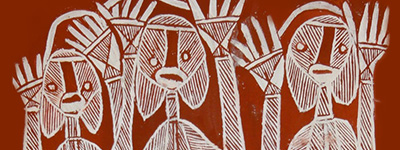Bininj Kunwok
Triangular Kinship Terms

na-babba
|
Audio |
|
|---|---|
|
Word Stem |
babba |
|
Etymology |
na- male noun class prefix, babba 'father' [cf Yolngu] |
Definitions |
|
|
#1 |
na-babba you are my BC, my na-kurrng ‘MMBS’, your kakkak ‘MMB’. Centricity is not clear, possibly egocentric (a na-kurrng is a kind of ‘father’) |
|
#2 |
na-babba you are my child (female propositus), my F/BS, your skewed F (ngunemodjarrkdorrinj FZS>F). Patrilineal links for both speech participants, actual or skewed, can be established to the referent. However, this may be isosceles centricity by default. It may be that the correct centricity designation is acentric. |
|
#3 |
na-babba you are my fDS, my fDSC (also BS or F), your S. Referent is maternal great-grandchild and son of the hearer. This person is in a section that collapses wDSC, BS and F which is collectively indexed by the term -babba. What is not clear is whether or not babba indexes a patricouple or just the ascending adjacent patrilineal generation. This is important for considering centricity. If it indexes only F and FZ, then the term in this context is egocentric. Although there is a gender prefix, there is no evidence that the prefix covertly indexes centricity of any sort. |
|
#4 |
na-babba you are my kakkak 'DC' (female ego), my F/BS (or classificatory na-kurrng ‘MMBS’), your na-kurrng 'MMF'. Referent is F/BS of the speaker and na-kurrng (or ‘poison cousin’) or maternal great-grandfather of the hearer MMF. As for the previous na-babba entry, the referent is in a section that collapses F, BS and na-kurrng MMBS, which is collectively indexed by the term -babba. What is not clear is whether or not babba indexes a patricouple or just the ascending adjacent patrilineal generation. This is important for considering centricity. If it indexes only F and FZ, then the term in this context is egocentric. Although there is a gender prefix, there is no evidence that the prefix covertly indexes centricity of any sort. As for the previous entry, it is possible that the term is acentric in that there is no evidence that it swings either way. -babba is a term which collapses F, mS and poison cousin MMBS, FZDS. As the referent is one of these kin for either of the speech participants, there appears to be no centricity. |
|
#5 |
na-babba you are my kakkak 'fDC', my cross-cousin/MMBDS, your skewed F (FZS/MBS>F). |
|
#6 |
na-babba you are my mawah ‘mSC’, my na-kurrng ‘SSS’, your S. babba seems to index the other person in a patricouple, thus a man’s child (or woman’s BC) or a person’s F. |
|
#7 |
na-babba you are my mawah ‘SS’, my SDS, your ZS.
No clear evidence for centricity. reciprocal suggests mamamh (MF) line, which is actually MFF. |
|
#8 |
na-babba you are my mawah ‘SS’, my S, your F(B). |
|
#9 |
na-babba you are my MB, my na-kurrng ‘MMBS’, your skewed ‘F’ (ngunemodjarrkdorrinj). |
|
#10 |
na-babba you are my MMB, my mamamh ‘MF etc’, your kanjok ‘brother-in-law/cross-cousin’. Possibly tucentric because a cross-cousin can be skewed to F |
|
#11 |
na-babba you are my mother, my skewed F (nganemodjarrkdorrinj FZS>F), your F/BS. |
|
#12 |
na-babba you are my eB (male propositus), our skewed father (nganemodjarrkdorrinj FZS>F). Reciprocal = na-kiwalak Why is the reciprocal different, i.e. na-kiwalak if the speech participants are siblings? |
|
#13 |
na-babba synonym = djongok you are my ZDS, my na-kurrng ‘MMBSSS etc’, your father. Reciprocal term = na-kiwalak |
|
#14 |
You are my korlonj ‘a woman’s brother’s child’, my na-kurrng ‘poison cousin’, your kakkak ‘MMB’.
|
|
#15 |
You are my child (female propositus), my father or brother’s son, your skewed father (fv:ngune-modjarrkdorrinj i.e. father’s sister’s son is converted to fv:ngabbard ‘father’).
|
|
#16 |
You are my daughter’s son, my daughter’s son’s child, (also brother’s son or father), your son.
|
|
#17 |
You are my fv:kakkak ‘daughter’s child’ (I am a woman), my brother’s son (or classificatory fv:na-kurrng ‘poison cousin’), your fv:na-kurrng 'MMF'. |
|
#18 |
You are my mawah ‘a man’s son’s child’, my na-kurrng ‘SSS’, your korlonj.
|
|
#19 |
You are my mawah ‘a man’s son’s child’, my doydoy ‘son’s daughter’s son’, your kangkinj 'sister’s son'.
|
|
#20 |
You are my mawah ‘son’s child’, my son, your father.
|
|
#21 |
You are my kakkak ‘MMB’, my mamamh ‘MF’, your kanjok ‘brother-in-law/cross-cousin’.
|
|
#22 |
You are my mother, my skewed father (ngane-modjarrkdorrinj ‘FZS becomes father’), your korlonj ‘brother’s son’.
|
|
#23 |
You are my kokok ‘elder brother’ (male propositus), our skewed father (ngane-modjarrkdorrinj FZS becomes father’).
|
|
#24 |
You are my kakkak ‘ZDS’, my na-kurrng ‘poison cousin’, your father.
|